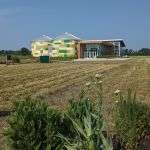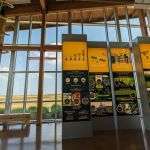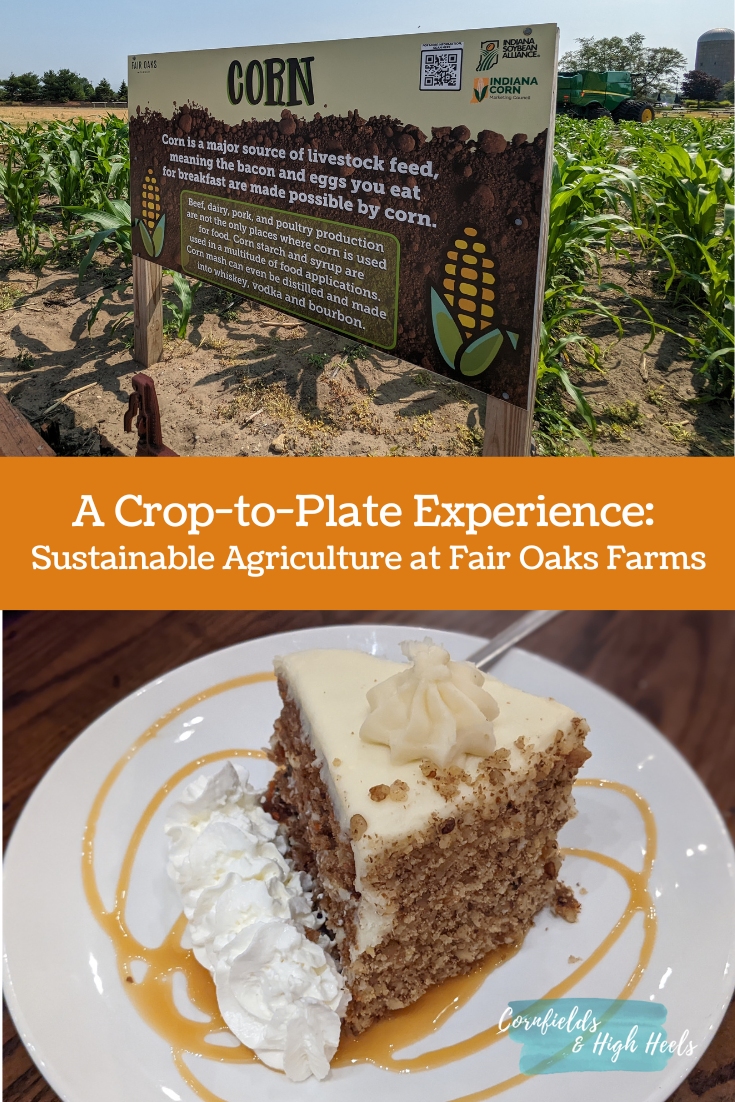A Crop-to-Plate Experience: Sustainable Agriculture at Fair Oaks Farms
Disclaimer: Blog posts may contain affiliate links/ads or be sponsored/hosted. If you click on these links, I may earn a small commission. This helps keep the blog running and supports me – at no cost to you. If you have any questions, please read my disclaimer and privacy policy. All opinions on Cornfields & High Heels are my own.
A Crop-to-Plate Experience: Sustainable Agriculture
Living in Indiana has had its privileges. For most of my life, I’ve lived in small towns and had easy accessibility to local produce and meats. It wasn’t unusual to walk outside and see cornfields and pastures. Homecooked meals were routine in my house, with food prepared with products from local farmers and gardens.
Over the years, as I’ve moved closer to a bigger city and traveled more extensively, my horizon for food and sustainable agriculture has expanded. The closer to a big city I get, the harder it is for me to obtain the same quality local produce and meats I’m accustomed to. And the more I travel, the more I’m conscious of the food quality served in restaurants. Some may refer to me as a “foodie.”
Sustainable agriculture is important to consumers. And it will only continue to grow in importance as consumers become more aware of the environmental and social impacts of their food choices. We demand more sustainable products, driving farmers and companies to adopt more sustainable production practices.
Disclaimer: This blog is sponsored by Indiana Soybean Alliance (ISA), Indiana Corn Marketing Council (ICMC). All opinions in this article are my own. Blog posts may contain affiliate links or ads. If you click on these links, I may earn a small commission. This helps keep the blog running – at no cost to you. If you have any questions, please read my disclaimer and privacy policy.
Fair Oaks Farms’ Crop Adventure
The Indiana Soybean Alliance (ISA), Indiana Corn Marketing Council (ICMC), and Fair Oaks Farms work together to promote sustainable agriculture. Fair Oaks Farm is an example of a farm incorporating practices to help to protect the environment, conserve resources, and produce high-quality crops. They are also committed to sharing their knowledge with others. Fair Oaks is a farm where you can genuinely have a crop-to-plate experience.
Fair Oaks Farms is open to visitors all year. Their Crop Adventure is a hands-on experience that teaches visitors about modern crop farming practices, the importance of soil, and the future of farming. The adventure begins in the outdoor crops, which flourish in the summer. Explore the crop fields and see how they are grown and harvested.
Inside the Crop Adventure Building, visitors learn about the different types of crops, how they are planted, harvested, and processed, the underground world, fuel alternatives, and the future of farming. The Crop Adventure is geared for all ages. There is a scavenger hunt to learn about crop farming and Farmington, a kid’s play area, a National Geographic movie about the future of agriculture, and educational games.
The Indiana Soybean Alliance (ISA) and Fair Oaks Farms partner to provide discounts on school field trips to Fair Oaks Farms and transportation grants to help with busing costs. This partnership has allowed more students to learn about agriculture and sustainability.
Sustainability Benefits
After hanging out in the Fair Oaks Farms outdoor crops with an agronomist (“an expert in the science of soil management and crop production”), I learned about some of the specific sustainability benefits of corn and soybean production that are in place today at many of the 20,000 family crop farms around Indiana.
-
- Reduced soil erosion: many farmers plant cover crops on their fields, which reduces soil erosion and improved soil health.
- Improved soil health: improves soil health by increasing soil organic matter
- Reduced pesticide use and fewer fertilizers: protects human health and the environment.
- Increased yields: Sustainable practices can help to increase crop yields, which benefits farmers and consumers.
- Improved taste and nutrition: Some of the soybean varieties planted today result in improved taste and nutrition in the oils created from them.
- Lower prices: increased yields can lower prices of products, and farmers can save money on things like fertilizer and pesticides.
Taste the Difference
Fair Oaks Farms offers three different opportunities to taste their crop production differences. Soybeans like the ones grown in their demonstration plots are crushed to feed livestock and to make High Oleic Soybean Oil, an FDA-approved, heart-healthy oil used to fry food on the menu at their restaurant. Most dishes served at Fair Oaks Farms restaurants are made from ingredients from the Farm and surrounding local farms.
The Farmhouse Restaurant is a fine-dining option serving lunch, dinner, and occasional brunch. The Cowfe is a casual, quick option for grilled cheese and deli sandwiches, soups, salads, and ice cream. The Dairycatessen is a grab-an-go option inside the Fair Oaks Farms gas station. They have sandwiches, salads, cheeses, and ice cream available. While there, you can fill up your tank – fuel alternatives like E85 and environmentally-friendly corn-based flex fuel are available.
The sustainable agriculture experience culminates in a meal at the Fair Oaks Farm restaurant, the Farmhouse Restaurant. The restaurant offers a variety of menu items, including pizzas, burgers, sandwiches, and pasta dishes – made with ingredients grown on the farm. The Farmhouse provides stunning views of the farm, and inside, you can watch the kitchen as they prepare your meal.
This a great way to learn about the importance of agriculture and the journey of food from the farm to our tables. It is also a fun way to end your day at Fair Oaks Farms.
Corn and soybean sustainability is important to consumers because it is more affordable, is better for our health, protects the environment, and benefits everyone.

















Yum! Such a fun place with the kids and now a food destination!